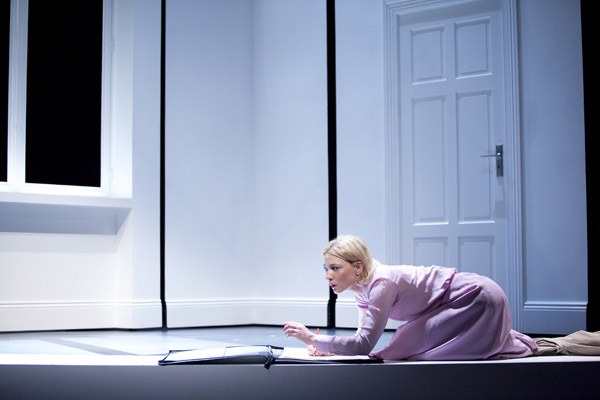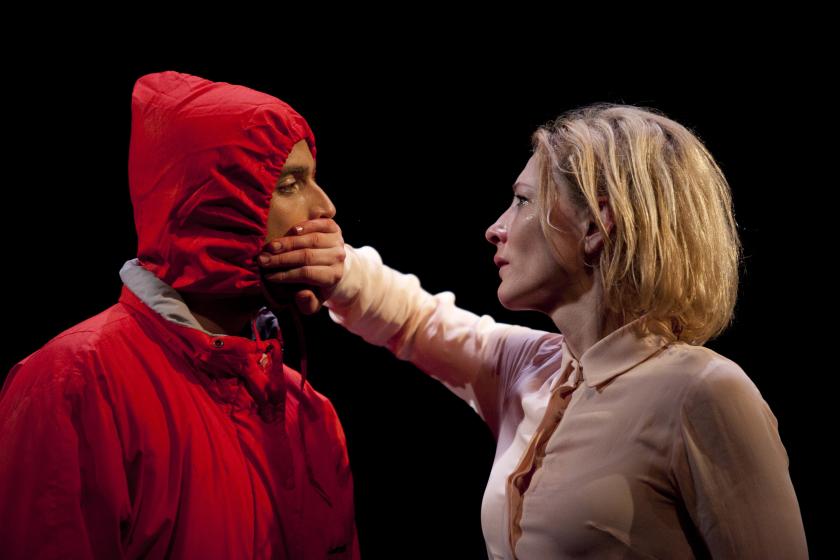It’s the star factor. Tickets for Big and Small, by the controversial German writer Botho Strauss, are selling fast because Cate Blanchett is in it. Her protean presence in this production by the Sydney Theatre Company, of which she is the co-artistic director, casts a glow over the whole event — she’s on stage for almost the entire running time of two and three-quarter hours. But there are other pleasures to savour here: chief of these is playwright Martin Crimp’s fresh, crisp and contemporary translation of the text.
Strauss’s 1978 play — Gross und Klein — is about Lotte (Blanchett) and her search for self. In the first scene, which is a 20-minute monologue set in Marrakesh, she tells of her recent separation from Paul, her husband, and her alienation from the other members of her holiday tour, “a whole hotel-full of sick people”. For her, language has become impoverished, and she yearns for authenticity. She eavesdrops on other people's conversations. One dissatisfaction grows into another.
Blanchett’s performance has an inspiring quality
Once she gets back to Germany, Lotte, who as a graphic designer is perhaps more comfortable with a pencil than with words, begins a journey to find connection and meaning in her life: the play opens out into a kind of philosophical road movie. It’s a quest in which a typical line is her baffled: “I’m looking for someone...” The nine stops on this trip are disconnected and often slightly bizarre: she visits people from her past, but can’t find satisfaction; she tries different jobs but fulfillment eludes her. Try as she may, she cannot shake off the figure of Paul (the playwright is male after all).
Benedict Andrews, who took over as director after the original choice, Luc Bondy, fell ill, is often delightfully playful and presents a varied visual palette: from the opening scene, in which Morocco is evoked by simply using a low white wall, a cocktail and a lime-green bag, there is an long parade of memorable sights: at one point the white walls of a room in a block of flats close in on Lotte; at another, the tower block where her childhood friend now lives is a narrow construction behind whose glass door she is trapped (pictured below right).
 In one place, Lotte — clutching a tiny red television — is pursued by a green tent, in another she works in an office whose drabness would suck the life out of anyone. This is the visual grammar of urban alienation. In one of the best scenes, she meets members of a family at a humorous seaside barbeque. In others, she bumps into junkies, guitar players, people waiting in a surgery and a man at the bus stop. At almost every point, words fail her and she is unable to make more than a random connection.
In one place, Lotte — clutching a tiny red television — is pursued by a green tent, in another she works in an office whose drabness would suck the life out of anyone. This is the visual grammar of urban alienation. In one of the best scenes, she meets members of a family at a humorous seaside barbeque. In others, she bumps into junkies, guitar players, people waiting in a surgery and a man at the bus stop. At almost every point, words fail her and she is unable to make more than a random connection.
Blanchett’s performance has an inspiring quality that is constantly surprising, often quirky and occasionally moving. Her Lotte is not a bloodless existential cypher, but a lonely and puzzled woman who is palpably lost. Her quest for a home, for a meaningful language as much as for a satisfying relationship, calls to mind the more recent heroines from the movies of David Lynch and Wim Wenders. Blanchett’s charisma and bravura acting — an impressive array of styles that swings from irritated itching to wild dancing, and from momentary radiance to gutsy feistiness — is compelling, and she gives real presence to ideas about existential angst and alienation in a materialist society. You can easily see why she chose to produce the play.
In her enterprise she is greatly helped by Crimp’s mildly updated and thoroughly entertaining text, which captures both the satire of Strauss’s original, and its various registers of language, from desperate anxiety to bureaucratic formula. Yet despite some judicious cutting, Strauss’s original play is a difficult beast to stomach. This is mainly because it starts with abstractions rather than real-life characters, and there’s not much drama in philosophy: Strauss states ideas but never interrogates them. What's missing is a sense of conflict. And I’m not at all convinced that he understands women. So despite all the virtuosity that Blanchett (pictured above), Crimp and Andrews bring to the party, the experience of watching the play is one of coming across the occasional oasis of pleasure in an arid landscape. We can easily agree with Strauss’s contention that there is something rotten in the postwar Welfare State, that hell is not so much other people as one’s own family, and that language is often as disappointing as it is expressive. But to be told all this over and over is almost enough to inspire disagreement. Despite good work from a large supporting cast and some excellent music, Big and Small is mainly worth seeing because of Blanchett’s heroic performance. Here the actor triumphs over the play.
So despite all the virtuosity that Blanchett (pictured above), Crimp and Andrews bring to the party, the experience of watching the play is one of coming across the occasional oasis of pleasure in an arid landscape. We can easily agree with Strauss’s contention that there is something rotten in the postwar Welfare State, that hell is not so much other people as one’s own family, and that language is often as disappointing as it is expressive. But to be told all this over and over is almost enough to inspire disagreement. Despite good work from a large supporting cast and some excellent music, Big and Small is mainly worth seeing because of Blanchett’s heroic performance. Here the actor triumphs over the play.















Add comment